A Taste For Pachamama
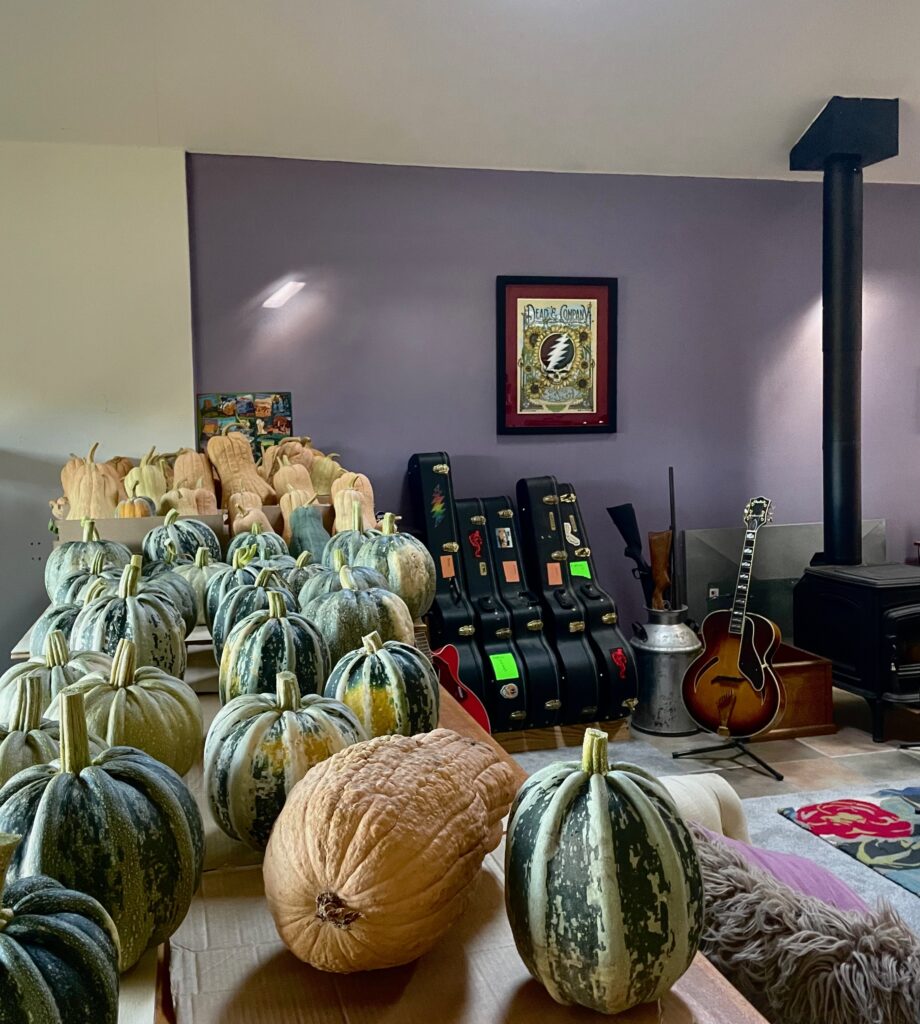
The bedroom slash squash storage warehouse. If I leave the squash in the field the squirrels will eat them all. Here they are safe.
Five school girls followed me down the steep cobbled street at a distance, giggling, until one of them got up the nerve to dash past, turn, and confront me. “Would you please come to my house for tea?” she asked.
Her friends crowded around. They were thirteen or fourteen years old, dressed alike in the matching skirts and dark sweaters of their school uniform and their hair was tied back in long black, glossy braids. Having gotten over their initial shyness, they made the quantum leap to boldness and began pelting me with questions; “Are you German? Why are you here? Are you married? Do you believe in God?”
“Shut up,” barked the boss girl. “He’ll answer our questions one by one in a proper interview.”
“Why, yes,” I replied. “I would be delighted to come to your house for tea.”
The girls went into a brief huddle, and arrangements were made. One girl wrote out the address on a piece of notepaper, another girl drew a map, and a third girl left to get some cookies. “We’re looking forward to visiting with you at 5:30,” they said. “Please come.”
They didn’t need to worry. I’d been traveling alone in Bolivia for a month. I was just coming back to town from a walk in the mountains when the girls stopped me. It was late in the day and windy. I was cold and tired. Hot tea sounded nice. These bronze faced girls were bright eyed and charming. I was curious to see how they lived.
I scrubbed up at the room where I was staying and found a clean shirt. The town was tiny, so the girl’s street wasn’t hard to find. I made sure to knock on the door precisely at 5:30, and the leader of the posse welcomed me into her home. I entered a small living room with a sofa against one wall. My young hostess motioned for me to sit. Her friends brought in chairs from the rest of the house and we all sat around the edges of the room, facing each other, with our backs to the walls. Hanging from the walls was a framed image of La Virgen del Socavón, a clock, and a calendar with a shiny picture of the Swiss Alps. The Alps looked like the painted backdrop for a toy train layout compared to the sullen peaks of the Andean Cordillera that loomed up behind the street outside. And rising up in the middle of the floor, almost filling the room to the ceiling, was a conical mountain of freshly dug potatoes.
The girls poured cups of mate de coca and passed around the cookies. They each spilled a ritual drop of tea onto the floor. “A drop for Pachamama,” they recited, “a drop for me.” Then came the flood of questions. “Are you German? Why are you here? Do you like our town? Have you been to Miami? Are you married? How many children do you have? How much money do you make?”
“One at a time,” I pleaded. So the girls slowed down and introduced themselves. Their homework assignment was to study a foreign country and write a report. I looked German. They would get good grades and extra credit for interviewing me. Formalities observed, the girls got down to business and I swung at their questions almost as fast as they pitched; “No, I wasn’t German. Yes, I liked Bolivia. No, I didn’t have children yet, although yes, I was already 32 years old and I did want a family, but no, I hadn’t met the right woman yet, and yes, I’d been to the Miami airport, but no, I don’t live there, and anyway California is nice too.” I even tried to ask the girls a few questions of my own.
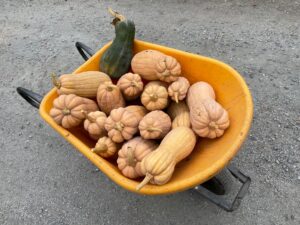
A wheel barrow load of Rugosa squash. This is an heirloom Italian variety of butternut squash. I will save the best examples of the breed for seed and sell (or eat) the rest when they’ve cured.
“How come you keep the potatoes in the house?” I asked.
“Because they’ll freeze outside or someone will steal them,” the girl said.
“In California I’m a farmer and I grow potatoes,” I said.
“Oh, everyone grows potatoes,” another girl said. I suppose she was right, at least in her world. “Besides,” she added, “you’re not a farmer; you are an ‘ingeniero agronomo.’ Germans aren’t farmers and farmers are too poor to travel.”
An ‘ingeniero agronomo” would be an agronomist or agricultural consultant. I understood where she was coming from; in rural Bolivia people as white as I am are not farmers. And farming there isn’t a trade people chose to do the way I decided to “become” a farmer; Their parents were born into a life on the land when they were born on to this planet and alternative existences seemed foreign and fantastic. And who would choose to be a farmer and labor outside? Their world was harsh. In the Andes the day may dawn icy, but by mid-morning the sun can be hot on your back. After sundown the temperatures drop again, until your hands and feet are numb. The atmosphere is thin and the air is dry. The sky overhead is deep blue by day, and by night it is jet black and sparkles with majestic drifts of stars. Outer space seems close.
Most people in Bolivia live on the Altiplano, which means “high plains” in Spanish. The Altiplano is high– the altitude ranges from 9,000 feet above sea-level to around 14,000 feet– but the land is nothing close to being as flat as its name implies. The daily extremes of temperatures in the Andes have prompted a number of plants to evolve tuberous growth habits. A tuber is a swollen, underground stem that stores up energy so that if a “killing frost” burns off all the foliage above the ground, the plant still has enough life protected under an insulating mantel of soil to sprout again. The concentrated sugars and starches found in tubers have made a number of them important food crops. The sweet potato, for example, is a tuberous morning glory from Peru that’s now cultivated all over the world. Andeans also cultivate an edible tuberous oxalis, called oca. Potatoes are tuberous nightshades that evolved in the Andes, and they are cultivated there in great profusion.
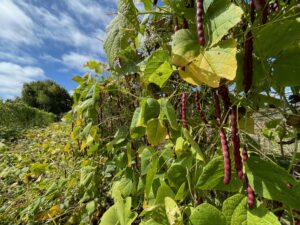
An heirloom bean from Oaxaca that I’m growing out for seed. This type is typically eaten fresh, like a green bean.
While we find just a few varieties of potatoes on our supermarket shelves, a farmer’s market in Bolivia has potatoes of every imaginable shape and color heaped up for display. Little marble sized potatoes are piled up next to long, skinny ones and big round ones in colors ranging from blues, reds and purples to yellows, whites and browns. The different kinds of potatoes were not simply appreciated for their rainbow of “decorator colors.” Each kind of potato had its own unique attributes; some were more drought resistant, so if there was very little rain they might produce a crop, even when the other kinds didn’t. Some breeds of potatoes were more disease resistant than others, or stood up to storage better, or tasted especially good in certain dishes. There is a logic behind their rainbow of potato varieties, not just a fetish for novelty.
Bolivian farmers have turned the extreme climatic conditions they must contend with to their advantage, and they use Mother Nature’s mood swings to preserve their harvests for the hard times they know lie ahead. Potatoes are cut into pieces and laid out on rocks under the sun to dry, while the farm dogs prowl and bark any marauding crows away. At night, any residual surface moisture that sweats out from the potato chunks is frozen into a spiky beard of ice crystals, which evaporate in the morning sun. After a few days of this treatment, the potato slices are essentially freeze-dried. These black leathery potato chips are called chuño, and can be kept without spoiling almost indefinitely. Chuño is an acquired taste, but when you get used to it, it’s earthy and satisfying in stews and broths.
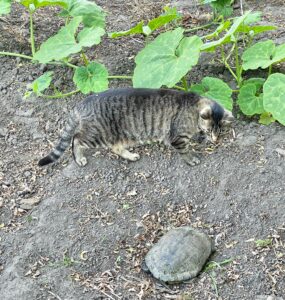
Our cat meets a wild turtle in the squash patch. She was curious, the turtle was not. It al;l turned out well.
Half the people I met in Bolivia talked of making their way to Miami. But among traditional people, it is still considered polite to thank the Earth Goddess, Pachamama, for the blessing of food. Even as the Virgin of the Mines looks down from the wall, the people will spill a drop of their beverage or let a crumb of their food fall to the ground before taking a drink or swallowing a bite. “A taste for Pachamama,” they’ll murmur, “a taste for me.” I heard this phrase so often in Bolivia that I began to notice the people who didn’t give thanks for what they had. Spilling drinks and food makes for sticky floors on buses and in public places but in the absence of any SPCA, giving “tastes” to Pachamama also keeps skinny, stray Bolivian dogs alive. Bolivia can be a tough place, but the habit everyday people have of giving “thanks” lends a hard and austere country a grace and humility that the populations of affluent countries can only aspire to.
I don’t think I ever convinced the young ladies that I wasn’t German. I answered some questions about life in California and had them laughing, even if they were disappointed that I didn’t live on a sugary, white sand beach with Gloria Estefan Y Miami Sound Machine.
When the tea party was over my hostesses thanked me profusely for helping them with their homework.
“Encantado,” I said, as I negotiated around the pile of potatoes and headed for the door. “The pleasure was mine.”

Alache in flower with a green seed. This is a Oaxacan potherb that is used to thicken broths in much the same way as okra (a relative) is used to give body to gumbo. I love how the seed looks like a Dharma Chakra.
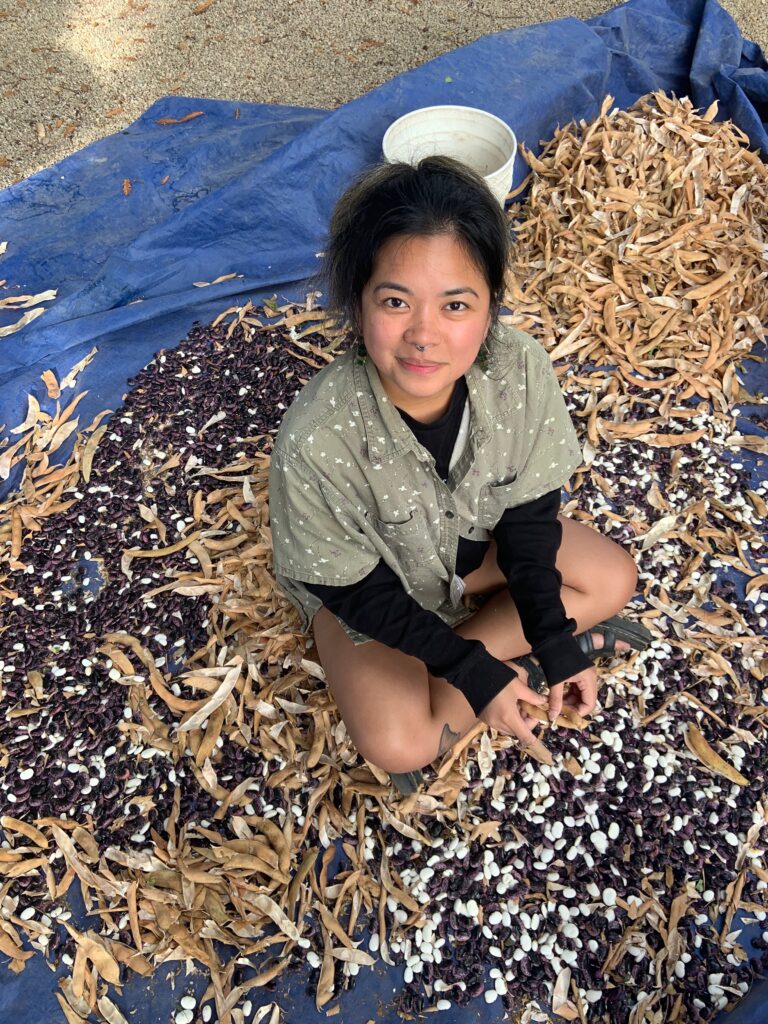
Victoria cleaning beans. We do the work by hand because we’re too small scale to make machinery much of an option.
The work never stops here, and we welcome volunteers. We can especially use help weeding the labyrinth since we use no herbicides. During the rose season it’s great to have some help “Dead-heading” the roses. Right now it’s bean season so we’re threshing, winnowing, and sorting beans. Here’s the link to our volunteer signup. https://www.mariquita.com/friends-of-ladybugs-labyrinth/
As always, keep an eye on our website or subscribe to our newsletter for info on upcoming pop up tomatopallozas and events. https://www.mariquita.com/events-and-workshops/
Thanks, and we hope to see you soon.
© 2023 Essay by Andy Griffin


